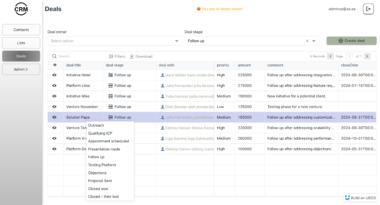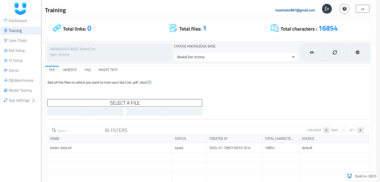MCP Google Workspace Server
A Model Context Protocol server for Google Workspace services. This server provides tools to interact with Gmail and Google Calendar through the MCP protocol.
Features
Multiple Google Account Support
- Use and switch between multiple Google accounts
- Each account can have custom metadata and descriptions
Gmail Integration
- Query emails with advanced search
- Read full email content and attachments
- Create and manage drafts
- Reply to emails
- Archive emails
- Handle attachments
- Bulk operations support
Calendar Integration
- List available calendars
- View calendar events
- Create new events
- Delete events
- Support for multiple calendars
- Custom timezone support
Example Prompts
Try these example prompts with your AI assistant:
Gmail
- “Retrieve my latest unread messages”
- “Search my emails from the Scrum Master”
- “Retrieve all emails from accounting”
- “Take the email about ABC and summarize it”
- “Write a nice response to Alice’s last email and upload a draft”
- “Reply to Bob’s email with a Thank you note. Store it as draft”
Calendar
- “What do I have on my agenda tomorrow?”
- “Check my private account’s Family agenda for next week”
- “I need to plan an event with Tim for 2hrs next week. Suggest some time slots”
Prerequisites
- Node.js >= 18
- A Google Cloud project with Gmail and Calendar APIs enabled
- OAuth 2.0 credentials for Google APIs
Installation
Clone the repository:
git clone https://github.com/j3k0/mcp-google-workspace.git cd mcp-google-workspaceInstall dependencies:
npm installBuild the TypeScript code:
npm run build
Configuration
OAuth 2.0 Setup
Google Workspace (G Suite) APIs require OAuth2 authorization. Follow these steps to set up authentication:
Create OAuth2 Credentials:
- Go to the Google Cloud Console
- Create a new project or select an existing one
- Enable the Gmail API and Google Calendar API for your project
- Go to “Credentials” → “Create Credentials” → “OAuth client ID”
- Select “Desktop app” or “Web application” as the application type
- Configure the OAuth consent screen with required information
- Add authorized redirect URIs (include
http://localhost:4100/codefor local development)
Required OAuth2 Scopes:
[ "openid", "https://mail.google.com/", "https://www.googleapis.com/auth/calendar", "https://www.googleapis.com/auth/userinfo.email" ]Create a
.gauth.jsonfile in the project root with your Google OAuth 2.0 credentials:{ "installed": { "client_id": "your_client_id", "project_id": "your_project_id", "auth_uri": "https://accounts.google.com/o/oauth2/auth", "token_uri": "https://oauth2.googleapis.com/token", "auth_provider_x509_cert_url": "https://www.googleapis.com/oauth2/v1/certs", "client_secret": "your_client_secret", "redirect_uris": ["http://localhost:4100/code"] } }Create a
.accounts.jsonfile to specify which Google accounts can use the server:{ "accounts": [ { "email": "your.email@gmail.com", "account_type": "personal", "extra_info": "Primary account with Family Calendar" } ] }You can specify multiple accounts. Make sure they have access in your Google Auth app. The
extra_infofield is especially useful as you can add information here that you want to tell the AI about the account (e.g., whether it has a specific calendar).
Claude Desktop Configuration
Configure Claude Desktop to use the mcp-google-workspace server:
On MacOS: Edit ~/Library/Application Support/Claude/claude_desktop_config.json
On Windows: Edit %APPDATA%/Claude/claude_desktop_config.json
Development/Unpublished Servers Configuration
{
"mcpServers": {
"mcp-google-workspace": {
"command": "<dir_to>/mcp-google-workspace/launch"
}
}
}
Published Servers Configuration
{
"mcpServers": {
"mcp-google-workspace": {
"command": "npx",
"args": [
"mcp-google-workspace"
]
}
}
}
Usage
Start the server:
npm startOptional arguments:
--gauth-file: Path to the OAuth2 credentials file (default: ./.gauth.json)--accounts-file: Path to the accounts configuration file (default: ./.accounts.json)--credentials-dir: Directory to store OAuth credentials (default: current directory)
The server will start and listen for MCP commands via stdin/stdout.
On first run for each account, it will:
- Open a browser window for OAuth2 authentication
- Listen on port 4100 for the OAuth2 callback
- Store the credentials for future use in a file named
.oauth2.{email}.json
Available Tools
Account Management
gmail_list_accounts/calendar_list_accounts- List all configured Google accounts
- View account metadata and descriptions
- No user_id required
Gmail Tools
gmail_query_emails- Search emails with Gmail’s query syntax (e.g., ‘is:unread’, ‘from:example@gmail.com’, ‘newer_than:2d’, ‘has:attachment’)
- Returns emails in reverse chronological order
- Includes metadata and content summary
gmail_get_email- Retrieve complete email content by ID
- Includes full message body and attachment info
gmail_bulk_get_emails- Retrieve multiple emails by ID in a single request
- Efficient for batch processing
gmail_create_draft- Create new email drafts
- Support for CC recipients
gmail_delete_draft- Delete draft emails by ID
gmail_reply- Reply to existing emails
- Option to send immediately or save as draft
- Support for “Reply All” via CC
gmail_get_attachment- Download email attachments
- Save to disk or return as embedded resource
gmail_bulk_save_attachments- Save multiple attachments in a single operation
gmail_archive/gmail_bulk_archive- Move emails out of inbox
- Support for individual or bulk operations
Calendar Tools
calendar_list- List all accessible calendars
- Includes calendar metadata, access roles, and timezone information
calendar_get_events- Retrieve events in a date range
- Support for multiple calendars
- Filter options (deleted events, max results)
- Timezone customization
calendar_create_event- Create new calendar events
- Support for attendees and notifications
- Location and description fields
- Timezone handling
calendar_delete_event- Delete events by ID
- Option for cancellation notifications
Development
- Source code is in TypeScript under the
src/directory - Build output goes to
dist/directory - Uses ES modules for better modularity
- Follows Google API best practices
Project Structure
mcp-google-workspace/
├── src/
│ ├── server.ts # Main server implementation
│ ├── services/
│ │ └── gauth.ts # Google authentication service
│ ├── tools/
│ │ ├── gmail.ts # Gmail tools implementation
│ │ └── calendar.ts # Calendar tools implementation
│ └── types/
│ └── tool-handler.ts # Common types and interfaces
├── .gauth.json # OAuth2 credentials
├── .accounts.json # Account configuration
├── package.json # Project dependencies
└── tsconfig.json # TypeScript configuration
Development Commands
npm run build: Build TypeScript codenpm start: Start the servernpm run dev: Start in development mode with auto-reload
Contributing
- Fork the repository
- Create a feature branch
- Commit your changes
- Push to the branch
- Create a Pull Request
License
MIT License - see LICENSE file for details
Google Workspace Server
Project Details
- j3k0/mcp-google-workspace
- MIT License
- Last Updated: 4/15/2025
Categories
Recomended MCP Servers

py-mcp-mssql

A simple and clear example for implementation and understanding Anthropic MCP (on AWS Bedrock).
MCP tool for exposing a structured task queue to guide AI agent workflows. Great for taming an over-enthusiastic...
A lightweight mcp server that tells you exactly what time is it based on your IP.
百度地图 MCP Server
IMAP and SMTP via MCP Server

An implementation of the Model Context Protocol for the World Bank open data API

ReActMCP is a reactive MCP server that empowers AI assistants to instantly respond with real-time, Markdown-formatted web search...

MCP for Video- or Image-Generation with Google VEO2
MCP server for Todoist integration enabling natural language task management with Claude
 From vibe coding to vibe deployment. UBOS MCP turns ideas into infra with one message.
From vibe coding to vibe deployment. UBOS MCP turns ideas into infra with one message.






